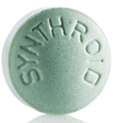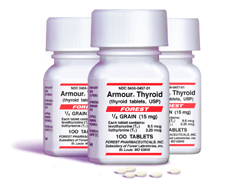Thyroid Medication Side Effects
Anytime you use any sort of thyroid medication, it’s important to understand the possible side effects that they might cause. Oftentimes people are given the wrong kind of medication or prescribed the wrong dosage which can cause some pretty nerve wrecking thyroid medication side effects.
So be sure to note any adverse reactions you might have and below I’ll discuss a few of the common types of thyroid medications and what kind of side effects you might experience and what they mean.
And also keep mind that medication or supplements should only be used together with the right hypothyroidism diet or else your hypothyroidism treatment will not be effective in the long run.
T4 Only Thyroid Medication Side Effects
 Believe it or not, T4 only medications are responsible for more thyroid medication side effects than the other forms of medication. And it is pretty apparent with how poor patients have been responding to these medications for years.
Believe it or not, T4 only medications are responsible for more thyroid medication side effects than the other forms of medication. And it is pretty apparent with how poor patients have been responding to these medications for years.
These T4 thyroid medications oftentimes cause a buildup effect of T4 within the body. And as a result, this tells your body to stop producing so much thyroid hormone. So, your thyroid slows down even more. And you can quickly become more hypothyroid than when you started.
The typical signs of this are when your symptoms begin to get worse or more frequent.
So with that being said, the typical T4 only thyroid medication side effects can be any of the various hypothyroidism symptoms.
T3 Only Thyroid Medication Side Effects
T3 is the active form of thyroid hormone that can be used directly by your cells without requiring your liver to be involved. And because of this, it is possible to have some thyroid medication side effects from T3 only medications.
If you introduce too much T3 to your body, your cells will absorb it and it can shift you from a hypothyroid state to a hyperthyroid state.
This can increase your metabolism and raise your core temperature above its normal 98.6 Fahrenheit (37.0 Celsius).
But it also makes you more susceptible to the effects of adrenaline. And this can lead to some uncomfortable thyroid medication side effects.
Mental Side Effects
- Anxiety
- Inability to concentrate
- Nervousness
- Irritability
- Restlessness
- Depression
- Emotional changes
- Anti-social behavior
Physical Side Effects
- Increased Body Temperature
- Headaches
- Insomnia
- Rapid Heart Rate (tachycardia)
- Heart Palpitations
- High Blood Pressure
- Chest Pain
- Fatigue
- Flushing
- Tremors
- Hair Loss
- Decreased Libido
- Light and Sound Sensitivity
These thyroid medication side effects should be taken seriously but are not permanent and will subside once your thyroid hormones normalize.
And it’s all the more reason to manage your stress levels and keep your blood sugar balanced. Both of these issues will drive adrenaline high.
Combined T4 and T3 Thyroid Medication Side Effects
 Combined T4 and T3 medication such as Armour Thyroid can also cause any of the thyroid medication side effects mentioned above.
Combined T4 and T3 medication such as Armour Thyroid can also cause any of the thyroid medication side effects mentioned above.
Because these medications contain predominantly T4, if your liver can’t convert the T4, then is can cause you to become even more hypothyroid and as a result, your hypothyroidism symptoms can actually get worse.
But if your liver is converting the T4 then you can effectively take too much and produce too much T3 thyroid hormone. And this will result in the same symptoms mentioned above due to the increased sensitivity to adrenaline.
Be sure to take look at the various Armour Thyroid side effects for more information.
Iodine Supplementation Side Effects
There’s a lot of talk of iodine deficiency and the use of iodine supplementation with hypothyroidism. And while iodine deficiency was a real issue at one point in time, it rarely is now in industrialized countries.
Today the vast majority of goiters are the result of excessive estrogen which has a similar effect of not allowing the thyroid gland to release its thyroid hormones.
But today, there are a lot of people recommending dangerously high levels of iodine without considering the negative side effects.
For starters, it can actually have the opposite desired effect and further suppress your thyroid and cause thyroiditis. It can also contribute to the development of many degenerative diseases.
But since it can suppress TSH levels then many people falsely believe that it is in fact working for them.
Anytime you take medication, for your thyroid or not, it’s important to monitor your body’s response to that medication. If you notice any of the thyroid medication side effects listed above, it should not deter you from using it. But you should work with your healthcare provider to fine tune the dosage or to find a thyroid medication that is more appropriate to your body’s needs.

